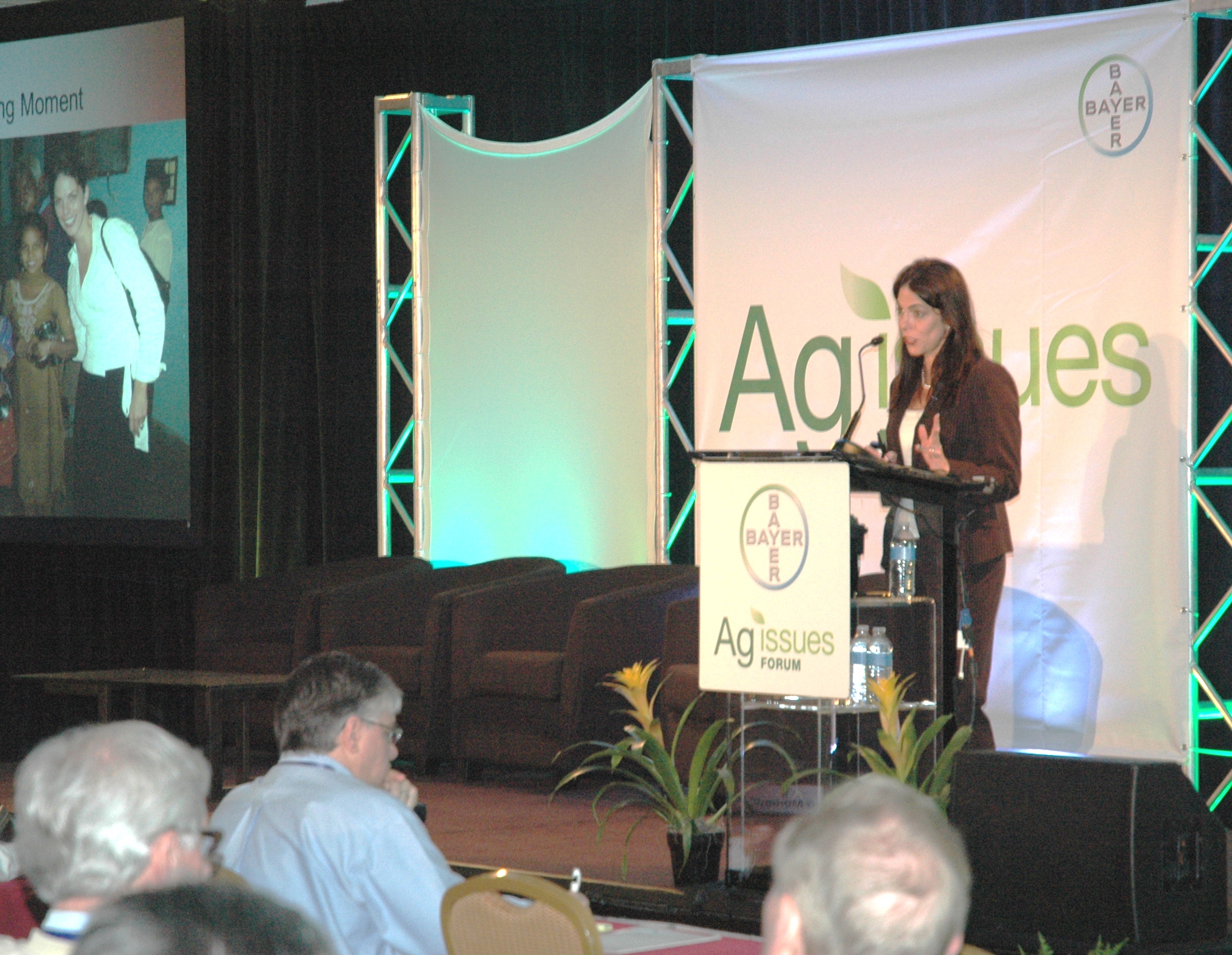San Antonio, Texas, USA
March 4, 2014
Julie Borlaug, granddaughter of Nobel Peace prize laureate and father of the Green Revolution Dr. Norman Borlaug, recently presented the keynote address to 165 U.S. and foreign newspaper, television, radio and Internet journalists at the 9th annual Ag Issues Forum in San Antonio.

Julie Borlaug, granddaughter of Nobel Peace Prize laureate Dr. Norman Borlaug and associate director for the Norman Borlaug Institute for International Agriculture, delivers the keynote address advocating science and biotechnology as important tools in addressing global food security at the recent Ag Issues Forum in San Antonio. (Texas A&M AgriLife Researc h photo)
The forum, presented by Bayer CropScience, was held in advance of the annual Commodity Classic, which is touted as the “nation’s largest farmer-led and farmer-focused convention and trade show.“
In her address, Borlaug, who is associate director for external relations at the Norman Borlaug Institute for International Agriculture, part of the Texas A&M AgriLife Research, Texas A&M University System, said her grandfather was a strong proponent of science and biotechnology as “weapons in the fight against world hunger.” She urged forum attendees to help “educate and inform the public” about the need for continued scientific and biotechnological advances in agriculture to feed a growing world population.
“In my view, advocates of biotechnology desperately need to do a better job of explaining to the public why it is so important to the future of humanity and why we should not deprive millions, even billions, of people from its promise,” she said. “Science has spoken and the consensus is that genetically modified foods are safe and have the same nutritional value as organics.”
Borlaug noted that the world population, currently estimated at 7.2 billion, is expected to reach 9.6 billion by 2050.
“Almost all of that growth will be in undeveloped or underdeveloped countries and in locations where smallholder farmers are already struggling to raise sufficient crops,” Borlaug said. “I wonder how many opposed to biotechnology have ever been to an undeveloped country where agricultural workers, many of whom are women, spend their days pulling weeds, hauling water and fighting against crop loss from insects, viruses, bacteria and fungi.
“Without the life-changing and life-saving innovations of science and biotechnology, such as crops that are more drought, pest or disease resistant, how can these small-landholder farmers hope to advance beyond mere subsistence, much less provide food to feed others?”
Borlaug said she hoped scientists, journalists and others either directly involved in or communicating about biotechnology would find more practical and uncomplicated terms and “jargon” to describe its benefits and make a better case for the necessity of agricultural advancements.
She noted some of the benefits of the application of proper science and biotechnology to agricultural crops included reducing the need for chemical inputs such as pesticides and herbicides, a smaller carbon imprint from less need for mechanized plowing and tilling, and the ability to specifically modify foods to contain more nutrients and grow in difficult environments.
“Opponents of what are termed GMOs or genetically modified organisms often use emotional and anti-corporate arguments to state their case,” she said. “But the real emotional appeal should be toward the vital and practical need for such innovation in the face of global food insecurity and the social instability this can cause.
“Most people in developed countries seem to have the perspective that food is somehow grown in the grocery store and is plentiful because they’ve never seen a shortage in their lifetime. They somehow feel, in spite of extensive research showing there is no nutritional difference between genetically modified foods and ‘organics,’ that non-modified foods are the only ones people should eat.”
She added that her grandfather was a scientist, but like many scientists he had “some difficulty in explaining why science is important.”
“But his innovation of developing a dwarf wheat triggered the Green Revolution — a true agricultural quantum leap that saved more than a billion lives,” she said.
She noted that March 25 of this year would have marked her grandfather’s 100th birthday, and that Dr. Norman Borlaug passed away in 2009 at age 95 after spending most of his life searching for ways to address world hunger.
“It’s ironic to me that some people would like to somehow go back a hundred years, to the time when my grandfather was born, in terms of agriculture and agricultural advancement,” she said. “But my granddad was not only a scientist and humanitarian, he was also a realist who understood that agriculture must always keep moving forward, not backward. He knew that science could and should be used to meet the challenges of farmers and others involved in agriculture throughout the world.”
She noted the recent destruction of a field of genetically engineered golden rice by protesters in the Philippines as an example of misdirected social conscience.
“This rice was to provide a new source of vitamin A, an essential nutrient whose absence causes blindness in a quarter-million to a half-million children, as well as about 2 million deaths, in Africa and Asia each year. It’s hard to believe anyone would want to deny this important food source to those who would so profoundly benefit from it.”
The key is choice, Borlaug said.
“We wouldn’t want to tell people not to eat organic foods, even if they’re paying more for something that’s nutritionally no different from genetically modified foods or because there’s no real ‘standard’ for organic production,” she said. “Conversely, we feel people should certainly be allowed to choose foods that have been improved and enhanced through biotechnology.”
However, she added, this is not to imply that biotechnology is the cure-all for world hunger.
“Multiple, integrated solutions are needed,” Borlaug said. “Farmers in underdeveloped countries need drought-resistant seeds, fresh water from improved irrigation, enhanced post-harvest storage and better roads for getting their crop to market. Biotechnology is just one of the tools the world needs to ensure adequate food security for this generation and the next.”